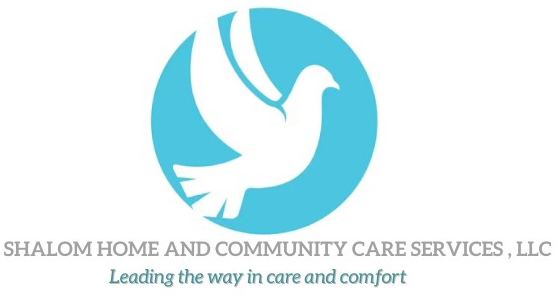Caring for a loved one is one of the most rewarding yet challenging roles a family member can take on. Whether you’re caring for an aging parent, a spouse with a chronic illness, or a child with special needs, being a family caregiver can come with both emotional rewards and overwhelming responsibilities. At Shalom Home and Community Care Services, we understand the unique challenges that family caregivers face and are here to support you on this journey. In this blog, we’ll share practical tips for managing stress, maintaining work-life balance, and recognizing the signs of caregiver burnout.
1. PRIORITIZE SELF-CARE: YOU CAN’T POUR FROM AN EMPTY CUP
Caregivers often put their loved ones’ needs ahead of their own, but it’s essential to take care of yourself as well. Neglecting your health and well-being can lead to physical exhaustion, mental fatigue, and even illness, making it harder for you to care for your loved one.
Self-Care Tips:
Schedule Time for Yourself: Carve out time each day, even if it’s just 10–15 minutes, to relax, meditate, or engage in activities you enjoy.
Stay Physically Active: Regular exercise, such as walking or yoga, can improve your energy levels, relieve stress, and boost your mood.
Eat a Balanced Diet: Fuel your body with nutritious meals, and avoid skipping meals even during busy caregiving days.
Sleep Well: Aim for 7–8 hours of quality sleep each night to recharge your body and mind. If sleep is interrupted, try taking short naps during the day.
2. SET REALISTIC EXPECTATIONS: YOU DON’T HAVE TO DO IT ALL
It’s easy to feel like you should be doing everything perfectly, but this can lead to unrealistic expectations and unnecessary stress. Caregiving is a demanding role, and it’s important to recognize your limits.
Tips for Managing Expectations:
Focus on What’s Most Important: Prioritize tasks that directly impact your loved one’s health and safety. Let go of less critical responsibilities that can wait.
Delegate When Possible: Don’t hesitate to ask for help from other family members, friends, or professional caregivers. Sharing the caregiving load can provide you with much-needed relief.
Be Kind to Yourself: It’s okay if things don’t go perfectly. Acknowledge that you’re doing your best, and give yourself grace for any missteps or challenges along the way.
3. MAINTAIN A WORK-LIFE BALANCE: SET BOUNDARIES AND PLAN AHEAD
Balancing caregiving duties with work, family life, and personal time can be overwhelming. Without proper boundaries and planning, it’s easy to feel like you’re constantly pulled in different directions.
Tips for Maintaining Balance:
Set Boundaries: Clearly define when and how you’ll be available for caregiving. Create a daily or weekly schedule that separates caregiving time from work or personal time.
Communicate with Your Employer: If you’re balancing a job with caregiving, consider talking to your employer about flexible working arrangements, such as remote work or adjusted hours.
Use Time-Saving Tools: Meal prepping, online grocery shopping, and using technology to manage medical appointments or medication reminders can save you time and reduce stress.
Incorporate Social Time: Spend time with friends and family outside of your caregiving responsibilities. Maintaining social connections is crucial for your emotional well-being.
4. RECOGNIZE THE SIGNS OF CAREGIVER BURNOUT: KNOW WHEN TO ASK FOR HELP
Caregiver burnout is a state of physical, emotional, and mental exhaustion caused by prolonged caregiving stress. It’s important to recognize the early signs of burnout to prevent it from worsening.
Common Signs of Caregiver Burnout:
Exhaustion: Feeling tired all the time, even after sleeping, or finding it difficult to complete daily tasks.
Irritability or Mood Swings: Becoming easily frustrated, anxious, or feeling overwhelmed by minor inconveniences.
Withdrawal: Avoiding social activities, neglecting relationships, or feeling isolated.
Health Problems: Experiencing frequent headaches, body aches, or getting sick more often due to stress.
Neglecting Your Own Care: Forgetting to eat, skipping doctor’s appointments, or ignoring your personal health.
What to Do if You’re Burned Out:
Seek Respite Care: Respite care offers temporary relief for family caregivers by providing professional care for your loved one, allowing you time to rest and recharge. Shalom Home and Community Care Services offers flexible respite care options to suit your needs.
Talk to a Professional: Consider speaking with a counselor or therapist who can help you manage the emotional aspects of caregiving and provide coping strategies.
Join a Support Group: Connecting with other caregivers can help you feel less alone. Support groups provide a safe space to share your experiences and learn from others in similar situations.
5. STAY ORGANIZED: CREATE A CAREGIVING PLAN
Organization is key to reducing stress and staying on top of your caregiving responsibilities. A well-structured caregiving plan can help you manage daily tasks more efficiently and avoid feeling overwhelmed.
Caregiving Plan Tips:
Use a Calendar: Keep track of doctor’s appointments, medication schedules, and other important events on a physical or digital calendar.
Create a Care Journal: Document your loved one’s health updates, medication changes, and daily progress. This will help you track their needs and communicate more effectively with healthcare professionals.
Prepare an Emergency Plan: Have a plan in place for emergencies, including contact information for doctors, caregivers, and family members, as well as a list of medications and health conditions.
6. PRACTICE MINDFULNESS AND STRESS-RELIEF TECHNIQUES
Incorporating mindfulness practices into your daily routine can help reduce stress and promote a sense of calm, even in the midst of caregiving challenges.
Mindfulness and Stress-Relief Tips:
Deep Breathing Exercises: Take a few minutes each day to practice deep breathing. This can help calm your mind and reduce physical tension.
Meditation: A short meditation session can improve mental clarity and help you stay focused and present.
Gratitude Journal: Write down things you’re grateful for each day, no matter how small. This practice can shift your perspective and reduce stress.
SUCCESS STORY: EMMA’S JOURNEY AS A FAMILY CAREGIVER
Emma, a full-time teacher, became a caregiver for her mother, who was diagnosed with Alzheimer’s. Juggling her career, family life, and caregiving duties took a toll on her health. “I didn’t realize how burned out I was until I started getting sick frequently,” Emma recalls. “But after reaching out for respite care and speaking with a support group, I was able to create a more balanced schedule and find time to take care of myself.”
With the help of Shalom Home and Community Care Services, Emma now has regular respite care in place, allowing her to focus on her career and spend quality time with her children while still ensuring her mother receives compassionate care. “I’ve learned that asking for help isn’t a weakness—it’s necessary for both me and my mom.”
CONCLUSION: YOU DON’T HAVE TO DO IT ALONE
Being a family caregiver is an act of love and dedication, but it’s essential to recognize when you need support. By prioritizing self-care, maintaining a balanced routine, and seeking help when needed, you can provide the best possible care for your loved one without sacrificing your own health and well-being.
At Shalom Home and Community Care Services, we are here to help lighten the load for family caregivers. Whether you need respite care, full-time support, or just guidance on managing caregiving responsibilities, we are ready to assist. Contact us today to learn more about how we can support you and your family on your caregiving journey.




